 |
Thusanang Project
 |
Lesotho Community and Family based Vulnerable Children’s Care Centre Project |
HELP !
THE AIDS ORPHANS IN AFRICA
50,000,000 estimated orphans in
Africa by the year 2010 (Unicef)
The onslaught of HIV erodes the traditional care system by simply overloading its caring capacity by the sheer number of orphaned children needing support and care.
HIV undermines the caring capacity of both families and communities by deepening poverty due to loss of labour and the high cost of medical treatment and funerals’ |
Make your donation today
Donations in US$ |
Children's Care Center Project
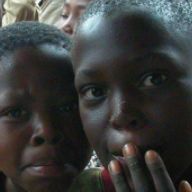
Lesotho is a small independent, beautiful but poverty stricken mountainous land-locked kingdom in Southern Africa. It has a population of approximately 2.5 million Africans known as Basotho in plural and as Mosotho in singular. The official HIV/AIDS infection rate is over 30% however, many believe it in reality to be over 50%.
There are over 200,000 orphans of which 100,000 are estimated to be HIV/AIDS related.
The Kingdom of Lesotho is made up of 10 districts, each having approximately 250 villages.
The lifestyle is generally rural with only one large town, Maseru, the capital, in the country.
Lesotho has experienced drought and famine over the last three years. |
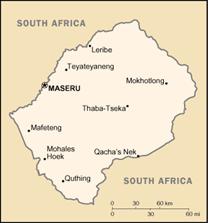
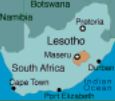
|
The overall objective of this project is to relieve the suffering of orphans and vulnerable children in Lesotho in Africa through the planning, financing, construction, staffing, maintenance and ongoing operation of Community and family based Vulnerable Children’s Care Centres.
The initial goal is to create a pilot project at Mount Moorosi, a village in the Quthing District of Lesotho with documented significant high-risk orphan populations. The centre will either be built or existing buildings extended in low cost traditional Basotho style and will include a kitchen for feeding vulnerable children and orphans, toilet and bathing facilities, space for educational, counselling and vocational skill building programming, as well as a few beds for short-term housing. Agricultural and other skills will be promoted to encourage self-sustainability and to reduce food costs to the centre.
Lesotho is a small independent, beautiful but poverty stricken mountainous land-locked kingdom in Southern Africa. It has a population of approximately 2.5 million Africans known as Basotho in plural and as Mosotho in singular. The official HIV/AIDS infection rate is over 30% however, many believe it in reality to be over 50%.
There are over 200,000 orphans of which 100,000 are estimated to be HIV/AIDS related.
The Kingdom of Lesotho is made up of 10 districts, each having approximately 250 villages.
The lifestyle is generally rural with only one large town, Maseru, the capital, in the country.
Lesotho has experienced drought and famine over the last three years.
A minimum of ongoing operational funding will be necessary to sustain each centre beyond the building/extension and furnishing of the original facilities. The sustainability of this project is based on the non-denominational management and staffing of these centres by the Basotho villagers themselves. Volunteers from the village and existing community resources will be utilized to provide ongoing programming and support.
A core value and activity of this project will be the counselling, support and placement of vulnerable children and orphans with extended families.
It is envisaged that this project will initially be organized and coordinated by the Catholic Church within the Diocese of Qacha’s Nek, Rotary Lesotho and Rotary International, Lovelight of Byron Bay of Australia and other stakeholders. The children’s care centre will be immediately managed by the non-denominational Thusanang Committees which will include the existing non-denominational humanitarian Justice and Peace Committees already set up by the Catholic Church, made up of the villagers themselves and set up within Mount Moorosi.
The basic belief in Divinity itself and the five human values of Truth, Love, Peace, Goodness and Non-Violence and the giving of selfless service will form the core functioning of this project.
This project is seen as a potential blue print for sustainable African community and family-based and village-run vulnerable children’s care centres required to address the growing HIV/AIDS pandemic that is sweeping Africa. An evaluation plan will be built into the design of this project so that we can test the viability of this concept and duplicate it if successful in other parts of Lesotho and Africa. We believe our proposed project represents ‘best practices’ as articulated in many United Nations documents and also adheres to the philosophy of the Lesotho government on dealing with the orphan crisis in this country.
The project will cater for all vulnerable children whether HIV/AIDS related or not.
While every effort will be made, as part of this project, to keep vulnerable children with appropriate village extended family units, we recognize that such prospects do not exist for all children who are orphaned. By extension, a further goal of this project is the potential development of new family units i.e., foster mother (and father where possible), and groupings of individual children and brothers and sisters who can provide each other with mutual support.
The cost of this initial 2 year phase of the project is AUD520,000 which will support 350 orphans and vulnerable children and enable the construction of a simple elegant operational Child Care Centre at Mount Moorosi (we have assumed support for half of the estimated 700 orphans and vulnerable children at Mount Moorosi). This document is being distributed to obtain this funding to enable this project to continue. |
The Problem
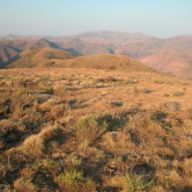
| The vast beautiful isolation of the highlands which form a large part of Lesotho.
Living in these harsh regions is very difficult. |
|
Lesotho is a land-locked mountain kingdom surrounded by South Africa. The economy is heavily dependent on agriculture and exporting water and labour to the South African mines. There has been a significant amount of retrenchment of workers from the mines over the past five years, leaving many families with little or no income.
Many of the miners also returned to Lesotho with HIV/AIDS and other chronic health problems. According to the HIV/AIDS surveillance data reported by the Ministry of Health and Social Welfare (2000), the HIV prevalence rate in the country is 30%. In a joint report issued by UNAIDS/UNICEF/UNAID, ‘Children on the Brink’ (2002), it was reported that by 2003 there would be an estimated 180,000 orphans in Lesotho, with 100,000 orphaned by AIDS and 49,000 of those children documented as double orphans (both parents deceased). On a recent fact-finding mission conducted by Lovelight of Byron Bay and the Justice and Peace Committee, our team visited three primary schools in the Qachas Nek and Quthing Districts and discovered that between one third and one half of the student body (135 students) were orphaned with approximately 100 single orphans and 25 to 35 double orphans.
|
The Need
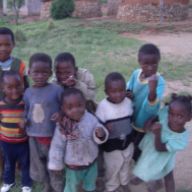
Basotho village children

Winter in Lesotho is extremely cold. Many of the mountains and the approximately 2,500 villages are around 2,500 to 3,000 metres above sea level, some even higher. Large tracts of Lesotho are covered in snow for many months in Winter, making the life of the poverty stricken Basotho people very difficult. |
|
Orphans in Lesotho need alternatives to institutional care where extended families do not exist or cannot afford to care for them any longer. While the Lesotho village social structure provides extended family support for many of the orphans, in many villages there remain dozens of vulnerable children who are homeless, uncared for, sexually abused or at risk for other forms of exploitation, including prostitution.
According to the United Nations Children’s Fund (Bjorn Ljungqvist, 2003), ‘...throughout sub-Saharan Africa, there have been traditional systems in place to take care of children who lose their parents for various reasons. But the onslaught of HIV slowly but surely erodes this good traditional practice by simply overloading its caring capacity by the sheer number of orphaned children needing support and care. HIV also undermines the caring capacity of families and communities by deepening poverty due to loss of labour and the high cost of medical treatment and funerals’
Keeping orphans in school is crucial to their futures. While primary education is basically free in Lesotho through 7th grade (as of 2005), many orphans are not in school due to extended family not being interested in educating them or able to afford other school fees. According to UNAID report ‘The Global HIV Epidemic, 2002’, 52% of the children orphaned by AIDS in Kenya were not in school compared to 2% among non-orphans. Stephen Lewis, UN Special Envoy for HIV/AIDS in Africa, stated in his report ‘Africa Recovery (2001)’, ‘There has to be a Herculean effort made for these kids so we don’t lose them. Otherwise you will have a society where kids haven’t been to school and therefore can’t fulfil even basic jobs...a society where a large proportion can have anti-social instincts because their lives have been so hard. You have a generation of children who will be more vulnerable to exploitation and to disease because they won’t have the same sense of self-worth’. One of the goals of this project will be to encourage orphans to remain in school and/or to provide educational opportunities on site including vocational and agricultural skill-building.
According to several studies, orphans are thought to be at greater risk for being malnourished and stunted due to their general lack of access to regular nutrition. Both ‘malnutrition and illness are associated with children who are alone after the death of their parents’ (pg. 225, ‘Turning A Crisis Into An Opportunity; Strategies For Scaling Up The National Response to the HIV/AIDS Pandemic-- UNDP). This Thusanang project seeks to provide at least two solid meals each day for both double and single orphans in each village.
Winter in Lesotho is extremely cold. Many of the mountains and the approximately 2,500 villages are around 2,500 to 3,000 metres above sea level, some even higher. Large tracts of Lesotho are covered in snow for many months in Winter, making the life of the poverty stricken Basotho people very difficult.
For AIDS orphans in particular, counselling and emotional support is essential. ‘These children suffer profoundly as their parents fall sick or die, with their experience characterized by psychosocial distress from their parents illness or death, which is worsened by the stigma and shame associated with HIV/AIDS. The psychosocial impact of caring for ill and dying parents cannot be overestimated. It can affect schoolwork and the ability to keep up in class. There is also the obvious hardship in relation to the inability of the parents to work, resulting in children being forced to take on frightening adult responsibilities’ (pg. 225, ‘Turning A Crisis Into An Opportunity; Strategies For Scaling Up The National Response to the HIV/AIDS Pandemic’ (UNDP) ). The toll on the family structure and the rush of these children into parental roles complicates their passage to adolescence and adulthood.
|
The Founder

|
Solihin Millin is the founder of Lovelight of Byron Bay Charitable Trust (Australia). Sol is an Australian citizen who was born in South Africa.
He was Scholar of the Year in 1960 at Hilton College, Kwazulu/Natal. He has a 1st class B.Sc Degree in Applied Math and Physics from Natal University in Durban. He has spent most of his professional career in the Information Technology field. After raising his three children in Australia, Sol has decided to focus his energy on humanitarian efforts and selfless service to the helpless and disadvantaged in Africa, based on the teachings of Sathya Sai Baba of India.
His websites: www.lovelight.org.au and www.byronbayattitude.com. |
DONATIONS
You can help these poor little children by making your donation today
Donations is US$
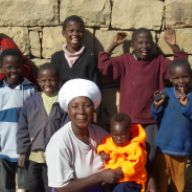
THANKS!
DOWNLOAD FULL REPORT HERE
|
 |